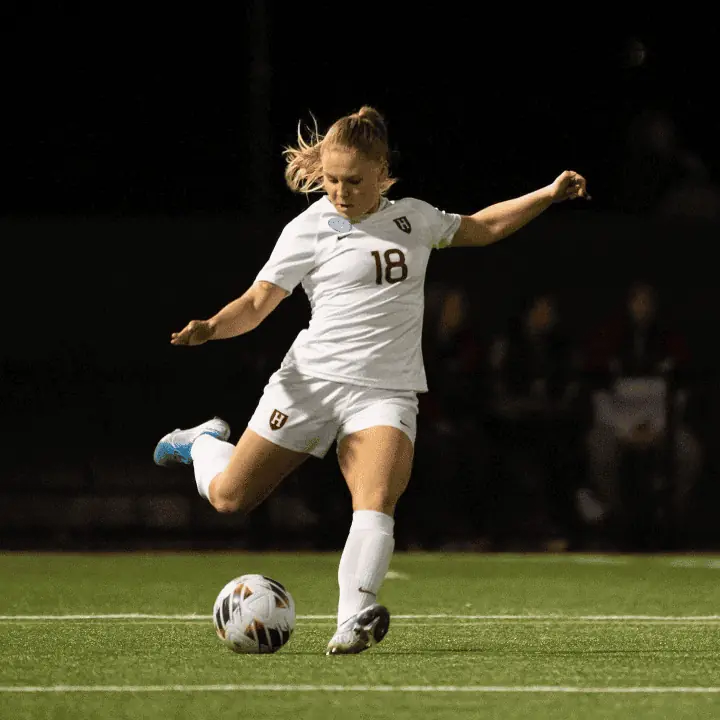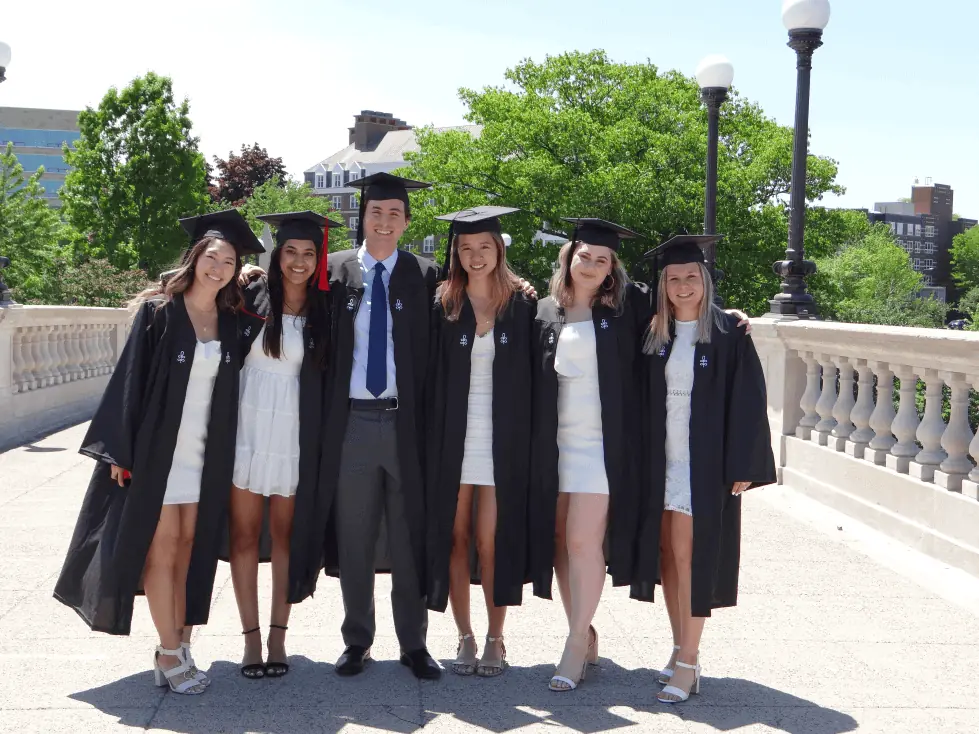Lara Schenk
| Sport | Soccer |
| Position | Midfield |
| University | Harvard University |
| Major | Bachelor in Psychology & Global Health |
| Sport | Soccer |
| Position | Midfield |
| University | Harvard University |
| Major | Bachelor in Psychology & Global Health |
I was made aware of the college soccer option by other German U-Nationals, and realized early on in the research process how unique and life-changing this opportunity was. It quickly became apparent that it was unique in the U.S. to have the sport and the degree program coexist at such a high level and continue to pursue both with the same intensity. In order to further my soccer career also through a different style of play and more facilities, and at the same time to get a bachelor’s degree, I then decided quite quickly that I wanted to go to the USA.

As a student-athlete at Harvard, I often had very packed days. The typical in-season day looked something like this:
8:30: Get up in my dorm and have breakfast with my roommate in Dining Hall.
9:00 – 12:30: 1-2 lectures or 1-2 smaller discussion groups
12:30 – 14:30: Break for lunch, do homework, call my family and friends in Germany, sometimes a short nap
14:30 – 18:00: Training time with individual mobility and prehab program (precautions to prevent injuries) in the Training Room (physio center), team training on our artificial turf, individual regeneration opportunities (ice bath, hot tub, rolling out, stretching, etc.)
18:30 – 19:30: Dinner in the Dining Hall with some teammates
20:00 – 22:00: Homework with my teammates in the Library or one of our Dorms (/ TV and frozen yogurt with friends when I didn’t have homework)
In my first semester, I was initially worried that I wouldn’t be on the same level academically as the other students at Harvard after all, but after that introductory period, I started to feel very comfortable in my major. I chose Psychology as my major and Global Health & Health Policy as my minor. What I found especially cool about Harvard was the freedom of the Liberal Arts program, where we were supposed to, and in some cases had to, take courses from different directions so that we didn’t specialize too quickly. This also allowed me to take unusual courses like “Science and Cooking” or “The Real Game of Thrones – Overlap with the European Middle Ages.”
The facilities at many colleges in the U.S. are far above the German standard – at Harvard we had a bubble built over the artificial turf field in the winter so we could continue to train in the warm on a large field, as well as a brand new soccer field from 2021, a huge weight training hall with its own artificial turf, and coaches who supported us at all times. Therefore, the training and the opportunities to develop as a player and person were even better than in many professional soccer clubs in Europe.

Gameday was always the best day of the week for our team. In training, we spent the week working towards it and analyzing opponents so that we could go into each game fit and confident. Our home game schedule for an early afternoon game looked something like this:
9:00: Get up in my dorm and breakfast in the Dining Hall.
10:00 – 12:00: Homework, call parents and friends from home, meet friends for coffee and a walk, TV, etc.
12:00: Pregame Meal with the entire team in the Dining Hall at Harvard Business School.
12:45 – 14:00: Final opponent analysis and game presentation by coaches in the booth, prehab, taping, music & lots of dancing in the booth
14:15 – 15:00: Warm-Up
15:00 – 17:00: Match
17:30 – 18:30: Postgame Meal together – either catering if we have one or a tailgate with home cooked meals organized by local parents
From 19:00: Free time, second dinner in the Dining Hall with friends, party with your own team and/or mixer with other sports teams
Train daily at the highest level and compete with up-and-coming athletes from around the world.
The USA offers you the best universities in the world: the academic content and methods are first-class and internationally recognized.
Take advantage of this unique opportunity to develop personally in a short period of time: gain experience with other cultures and learn perfect English.
One thing is for sure: You will stand out positively for future employers with your international education.
We had a physio who was responsible for us full time, whether in-season or out-of-season. She traveled with us to away games and was also at every training session on the pitch in case something happened in training or to do rehab training with the injured players. I also built a personal friendship with our physio over the years as she also protected me from myself many times and didn’t let me overtrain. Even now after college, we still write and talk on the phone from time to time.

In summary, I am very grateful for my time at Harvard – I developed as a soccer player, but even more as a person. Being able to get a world-class bachelor’s degree there is priceless, but I also got to be a regular player on our team for three years and build a professional soccer career back in Europe through my experience in the US. On top of that, I made a lot of my best friends there and also learned a lot culturally about life abroad and specifically in the US. Exactly because I thought it was so cool to live abroad and play soccer at the same time, I’ve now decided to do the same in Belgium and continue to play soccer professionally abroad before maybe moving back to Germany completely and hopefully playing in the Bundesliga.

I would recommend a degree program and college sports without hesitation – simply because academically and athletically you can only pursue both so intensely there. At least in women’s soccer. Your teammates will become your second family both on and off the field, you will get to know other students outside of your sport and background, and thus take so much with you culturally as well. Finally, such an experience abroad will make you more interesting and versatile for different international employers, as student-athletes in the USA are a guarantee for good time management and excellent teamwork skills.